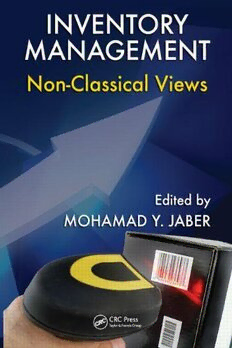
Inventory Management: Non-Classical Views (Industrial Innovation) PDF
228 Pages·2009·3.283 MB·English
Most books are stored in the elastic cloud where traffic is expensive. For this reason, we have a limit on daily download.
Preview Inventory Management: Non-Classical Views (Industrial Innovation)
Description:
As markets become more dynamic and competitive, companies must reconsider how they view inventory and make changes to their production and inventory systems. They must begin to think outside the classical box and develop a new paradigm of inventory management. Exploring the trend away from classical models based on economic order quantities to dependent demand systems, Inventory Management: Non-Classical Views comes as a just-in-time resource. Explore the new role of inventories in business enterprises This book discusses a new paradigm for inventory management that is responsive to dynamic changes in the economy. It explores: Inventory systems that provide flexibility Inventory performance measures other than using cost as a means to control inventory Inventory as a contributor to customer value creation, rather than a liability The book also examines why energy and the environment are to be considered in inventory decisions, the non-classical application of inventory management in fields such as healthcare and disaster relief, and non-classical approaches to measuring the performance of inventory such as information theory, fuzzy sets, and thermodynamics. While many factors may change, one certainty is that the global economy is becoming increasingly dynamic. Planting the seeds for new research in inventory control and management, this book outlines the evolving role of inventories in business enterprises. It explores how to create inventory management as a tool for continued success regardless of market fluctuations and economic variances.
See more
The list of books you might like
Most books are stored in the elastic cloud where traffic is expensive. For this reason, we have a limit on daily download.
